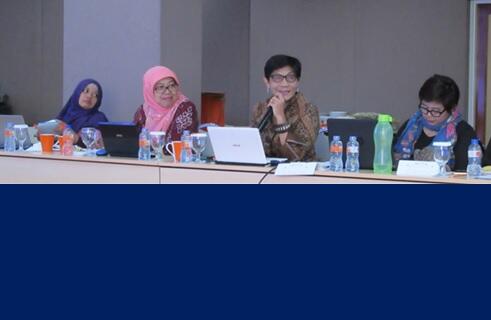JAKARTA, 31 Jan. 2017: In a bid to capture the prevalence of Female Genital Mutilation and Cutting (FGM/C) in the community, around 30 members of a consultative group consisting of government officials, researchers, statisticians and activists met to discuss the FGM/C survey design.
The survey will be implemented in June 2017, in 17 districts from 10 provinces, which includes 7 provinces with the highest FGM/C prevalence (2 districts per province) and 3 provinces with a regional bill on FGM/C (1 district per province). The ten provinces are Gorontalo, Bangka Belitung, Banten, South Kalimantan, Riau, West Java, West Sulawesi, Jambi, West Sumatera and West Nusa Tenggara. “Having the regional bill means that the three provinces, namely Jambi, South Kalimantan and West Nusa Tenggara recognize FGM/C as part of health sector’s contribution to the Regional Budget,” said Budi Wahyuni a Commisioner of the National Commission on Violence Against Women (NCVAW).
The NCVAW is tasked with the qualitative analysis, while the Center for Population and Policy Study –Gadjah Mada University (PSKK-UGM) - will focus on the quantitative aspects. The consultative team is providing expert inputs throughout the planning and implementation of the survey. The survey findings will enable decision makers to determine the links between FGM/C practice and child marriage, religious affiliation, migration and domestic violence.
Other members of the consultative group include representatives from the Ministry of National Development Planning (BAPPENAS), Ministry of Women’s Empowerment (MOWECP), Ministry of Health, BPS-Statistics Indonesia, National Commission for Child Protection (KPAI), activist from Fatayat NU, a researcher from Atmajaya University and representatives of religious leaders, UNWomen and the Department of Foreign Affairs and Trade (DFAT).
FGM/C is a violation of women’s rights and a harmful practice with significant potential health impacts, ranging from anxiety to serious reproductive health problems such as infection and sexual dysfunction. Some communities across Indonesia still widely practise FGM/C, performed by traditional birth attendants (TBAs), or midwives, or TBAs under the supervision of midwives.
While Indonesia has already ratified the Convention on Elimination on Violence Against Women (CEDAW) and the Convention on the Rights of the Child, a differing stance on FGM/C can be observed in society, including among some religious and community leaders. The Indonesian Council of Ulemas (MUI) issued a fatwa prohibiting the banning of the practice. The MoH rejects the practice saying that it offers no beneficial effect and may entail health risks. However, because demand is high, the practice that stems from cultural and religious tradition still prevails.
The survey is supported by UNFPA, with funding from Australia’s DFAT. The survey findings will be used to intensify efforts for the elimination of FGM/C.


